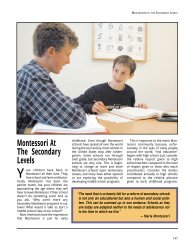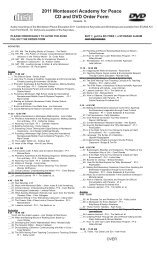Tim Seldin & Paul Epstein Ph.D. An Education for Life
Tim Seldin & Paul Epstein Ph.D. An Education for Life
Tim Seldin & Paul Epstein Ph.D. An Education for Life
You also want an ePaper? Increase the reach of your titles
YUMPU automatically turns print PDFs into web optimized ePapers that Google loves.
Foreword<br />
W<br />
hat is education <strong>for</strong>? How we answer this question is critical <strong>for</strong> the future of our children,<br />
our nation, and our world. Yet all too often it gets lost in debates about standards, testing, and<br />
other procedural re<strong>for</strong>ms that treat education as something to be done to children rather than<br />
<strong>for</strong> and with them.<br />
The Montessori Way shows that we can, and must, go back to basics – to the real purpose of education as<br />
drawing <strong>for</strong>th from each one of us our full human potential. It is a highly practical book. But it is much more<br />
than that. It describes a way of life – a way of thinking about the nature of intelligence, talent, and the potential<br />
<strong>for</strong> goodness and greatness among all people, a way to nurture and inspire the creativity, curiosity, leadership,<br />
love, and imagination that lies within us all. It reminds us that the child is the<br />
mother/father of the woman/man she or he will one day become, and that the most important human task<br />
is to nurture and educate children.<br />
Based on the pioneering work of Maria Montessori, as well as more recent knowledge about how children<br />
develop, learn, and access their full humanity, The Montessori Way embodies what I call partnership<br />
education. It is designed not only to help young people better navigate through our difficult times, but also to<br />
help them create a more peaceful, equitable, and sustainable future.<br />
Rather than relying on a paradigm of domination and submission, of winning and losing, of external<br />
rewards and punishments, of top-down rankings, fear, manipulation, indoctrination, and pressure to<br />
con<strong>for</strong>m, The Montessori Way presents an education that focuses on partnership, independence, mutual<br />
trust, and respect, on both individual achievement and collaboration, while developing our minds and hearts.<br />
Explicitly or implicitly, education gives young people a mental map of what it means to be human. Much<br />
of what young people worldwide learn through both their <strong>for</strong>mal and in<strong>for</strong>mal education holds up a<br />
distorted mirror of themselves. When their vision of the future comes out of this limited world view, they cannot<br />
develop their full humanity or meet the unprecedented challenges they face.<br />
In The Montessori Way, <strong>Tim</strong> <strong>Seldin</strong> and <strong>Paul</strong> <strong>Epstein</strong> offer sound guidelines, practical tools, and<br />
inspiring real-life stories of how, working together teachers, children, parents, and others can create<br />
learning communities where everyone can feel safe and seen <strong>for</strong> who we truly are, where our essential<br />
humanity and that of others shines through, lifting our hearts and spirits, empowering us to realize our highest<br />
intellectual, emotional, and spiritual potentials.<br />
In her unshakable faith in the human spirit and her fearless challenge to traditions of domination, Maria<br />
Montessori is one of my role models. Her legacy, as expanded and enriched by countless others, is the gift of<br />
this wonderful book.<br />
— Riane Eisler is author of Tomorrow’s Children:<br />
A Blueprint <strong>for</strong> Partnership <strong>Education</strong> in the 21st Century,<br />
The Power of Partnership, and The Chalice and The Blade.




